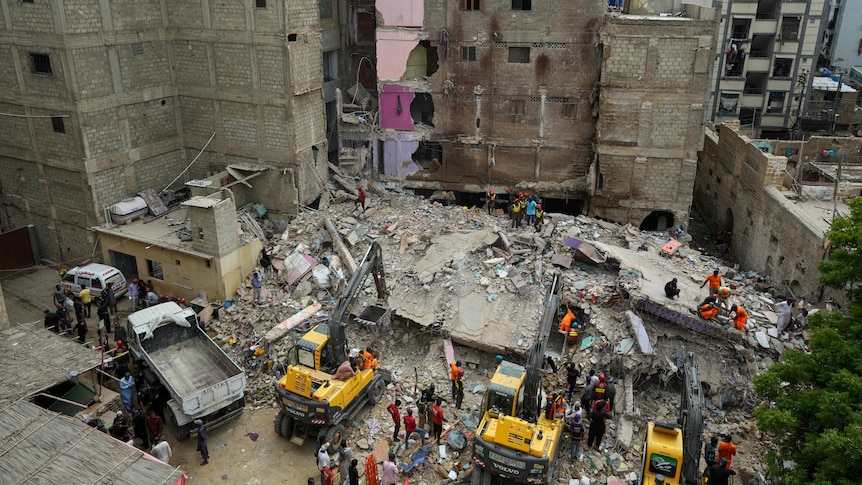
The death toll from the collapse of a residential building in Karachi, Pakistan, has risen to 21, as rescue teams continue their search for survivors in the impoverished Lyari neighborhood. Residents reported hearing ominous cracking sounds shortly before the apartment block crumbled on Friday morning. The area, once notorious for gang violence, is now grappling with this tragic incident.
Authorities had previously declared the building unsafe, issuing eviction notices over the past three years. However, some landlords and residents claim they never received these warnings. As rescue operations extend into a second day, the challenge is compounded by the building’s location on a narrow street, which hampers the deployment of heavy equipment.
Rescue Efforts and Community Impact
Late on Saturday, senior district government official Javed Nabi Khoso confirmed the death toll and stated that rescue operations were still underway. The uncertainty remains about whether more individuals are trapped beneath the rubble. Families anxiously await news of their loved ones, with temperatures soaring to 33 degrees Celsius, adding to their distress.
Dev Raj, a father, expressed his anguish to AFP, revealing that his daughter was among those trapped. “She was my beloved daughter. She was so sensitive but is under the burden of debris. She got married just six months ago,” he lamented.
Controversy Over Eviction Notices
Mr. Khoso asserted that notices had been served in 2022, 2023, and 2024, urging occupants to vacate the premises. “We don’t want to impose our orders by force. We work in phases and send them notices to leave the building. They didn’t take the notices seriously,” he told AFP.
However, Imran Khaskheli, an owner and resident, contested this claim, stating he had seen cracks in the building’s pillars early on Friday. “I knocked on all the doors and asked families to leave immediately,” he said, noting that about 40 families resided in the building, but many ignored his warnings.
According to Mr. Khoso, more than 50 buildings in the district have been declared unsafe, with six evacuated since the collapse.
Personal Tragedies and Broader Implications
The collapse has disproportionately affected women, who are more likely to be at home during the day. Jumho Maheshwari, a 70-year-old resident, recounted the devastation: “Nothing is left for me now. My family is all trapped and all I can do is pray for their safe recovery.”
Survivors reported witnessing cracks in the building on the morning of the collapse. Shankar Kamho, another resident, was alerted by his wife about the cracking sounds. “I told her to get out immediately,” he said, but his wife’s warnings to neighbors were met with skepticism.
Construction Standards Under Scrutiny
Building collapses are not uncommon in Pakistan, where construction standards are often poorly enforced. Many structures are built with substandard materials, and safety regulations are frequently ignored to cut costs. The collapse in Karachi is reminiscent of a similar incident in June 2020, when another apartment building in the city collapsed, resulting in 22 fatalities.
According to sources, “Building collapses are common in Pakistan, where construction standards are often poorly enforced.”
The tragedy in Lyari underscores the urgent need for stricter enforcement of building codes and more effective communication between authorities and residents. As rescue efforts continue, the focus will inevitably shift to accountability and prevention of future incidents.
The government and local authorities face mounting pressure to address these systemic issues and ensure the safety of Karachi’s residents. The coming days will likely bring more scrutiny and calls for reform in Pakistan’s construction industry.






